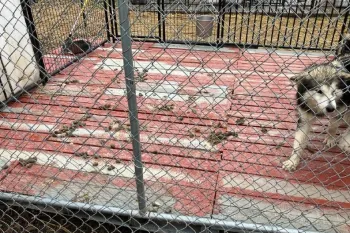WASHINGTON—Humane World for Animals, formerly called the Humane Society of the United States, has released its annual Horrible Hundred puppy mill report, which details violations or concerns at a sampling of 100 problem puppy mills across the country to educate the public about conditions in breeding operations. Puppy mills included in this year’s report were found to have injured, sickly or emaciated dogs or puppies; animals exposed to extreme heat or cold; dogs kept in dangerous, dirty or cramped conditions; and facilities that did not prevent and treat potential disease outbreaks, among other concerns.
Humane World for Animals researchers combed through inspection reports from state agencies and the United States Department of Agriculture to reveal horrendous practices in puppy mills that sell to pet stores, online and through social media. Some of the most shocking conditions witnessed by state and federal inspectors at problematic commercial dog breeders, also known as puppy mills, in this year’s report included:
- A dog with a facial wound so severe his teeth could be seen through the torn skin. Despite a $5,000 USDA fine and no longer holding a federal license, Arrow Wind Kennels still appears on Oklahoma’s state kennel license list.
- Inadequate health records on puppies at Contented Puppies Paradise, which is operated by Wilbur Byler in Missouri. Reports also noted that Byler had incomplete records for puppies who died.
- A shih tzu with multiple seeping wounds and green pus with a pungent odor at a breeder in Illinois. Inspectors noted that the dog pulled away as if in pain when touched.
- Underweight dogs with their spines and pelvic bones visible at Berntsen Living Trust in Kansas.
Despite egregious concerns documented by inspectors, many of the breeders featured in the report are USDA licensed and inspected. The federal Animal Welfare Act requires licensing and inspection of breeders who sell puppies to pet stores and online. Amid long-standing concerns about inspection and enforcement standards, recent slashes to the federal workforce including the USDA have escalated fears that dogs in breeding facilities will be even more at risk.
“The suffering of dogs and puppies in puppy mills across the country has far too often slipped through the cracks even with the existing minimal USDA standards and inspections,” said John Goodwin, senior director of Humane World for Animals’ Stop Puppy Mills campaign. “We are gravely concerned about the impact of recent slashes to the federal workforce and how that might result in even less accountability for the breeding operations that profit off treating dogs like products. It’s more important than ever for the public to refuse to participate in this cruel industry by rejecting puppy-selling pet stores and other puppy mill outlets.”
States with the highest numbers of breeders included in this year’s report include Missouri, Ohio, Iowa, Pennsylvania and New York. At least 25 dealers in the report sold puppies to Petland and Petland-owned stores, or have been listed on Petland’s website as one of their breeders; Petland is the only remaining national puppy-selling pet store chain. At least 30 of the dealers in this report are linked to the American Kennel Club, a dog registry organization. Motivated by the fees it receives for every registered puppy, the AKC routinely opposes humane laws that would help curb puppy mill cruelty. Some of this year’s Horrible Hundred breeders advertise on the AKC’s Marketplace website.
Animal advocates can do their part by voicing their support for the Puppy Protection Act and the Better CARE for Animals Act—two pieces of federal legislation that would improve conditions for puppies and dogs at mass breeding facilities. Eight states and almost 500 localities have already passed laws to end the sale of puppies in pet stores, cutting off the puppy mill pipeline.
Humane World encourages anyone who wants a puppy to consider shelter adoption first, or to visit a home breeder in person and see where the puppy was born and raised. Anyone who has purchased a sick puppy from a pet store or a suspected puppy mill can report it to their local authorities or to Humane World for Animals.
